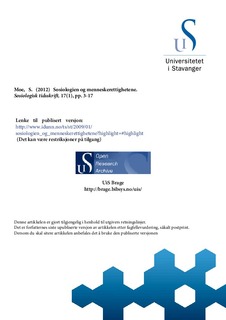| dc.contributor.author | Moe, Sverre | |
| dc.date.accessioned | 2014-04-29T13:00:59Z | |
| dc.date.available | 2014-04-29T13:00:59Z | |
| dc.date.issued | 2009-01 | |
| dc.identifier.citation | Moe, S. (2009) Sosiologien og menneskerettighetene. Sosiologisk tidsskrift, 17(1), 3-17 | nb_NO |
| dc.identifier.issn | 0804-0486 | |
| dc.identifier.uri | http://hdl.handle.net/11250/194529 | |
| dc.description.abstract | Sociology has traditionally been critical of the idea of universal human rights. Marx, Durkheim and Weber all opposed it from quite different positions. Generally, their criticism pointed to human rights as making man into something abstract, a-historical and decontextualized, thus representing notions contrary to questions concerning relations of man and society that are central to sociology. Likewise, the normative and ideological character of the rights was understood as contrary to sociology as an empirical science in its own right. Still, the idea of human rights has continued to expand, with modern society now referring to the issue in numerous situations. Modern sociology therefore has to ask why the relation between man and society is expected to be ordered by granting people expanded rights and to study how this order is working. The article focuses on relevant theoretical and empirical sociological themes for the study of human rights in world-society. | nb_NO |
| dc.language.iso | nob | nb_NO |
| dc.publisher | Universitetsforlaget | nb_NO |
| dc.subject | VDP::Samfunnsvitenskap: 200::Sosiologi: 220 | nb_NO |
| dc.subject | mennskesrettigheter | nb_NO |
| dc.title | Sosiologien og menneskerettighetene | nb_NO |
| dc.type | Journal article | nb_NO |
| dc.type | Peer reviewed | nb_NO |
| dc.source.pagenumber | 3-17 | nb_NO |
| dc.source.volume | 17 | nb_NO |
| dc.source.journal | Sosiologisk tidsskrift | nb_NO |
| dc.source.issue | 1 | nb_NO |
